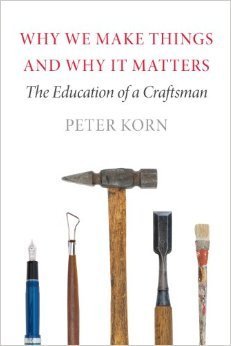What do you think?
Rate this book


176 pages, Hardcover
First published October 31, 2013
Every man-made thing, be it a chair, a text, or a school, is thought made substance. It is the expression of someone's ... ideas and beliefs.
My father sang a song to me, and then we would sing it together: The bear went over the mountain (repeated three times). And what do you think he saw? He saw another mountain (repeated three times). And what do you think he did? The bear went over the mountain...
And on we'd sing. And so it is. As a maker you put one foot in front of the other and you own the journey. Finding creative passion that governs your life may be a curse as well as a blessing, but I would not trade it for anything else I know.